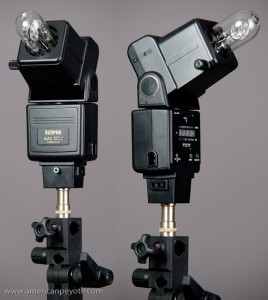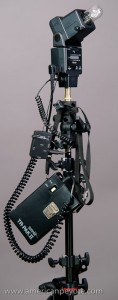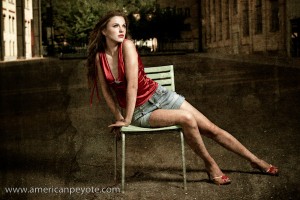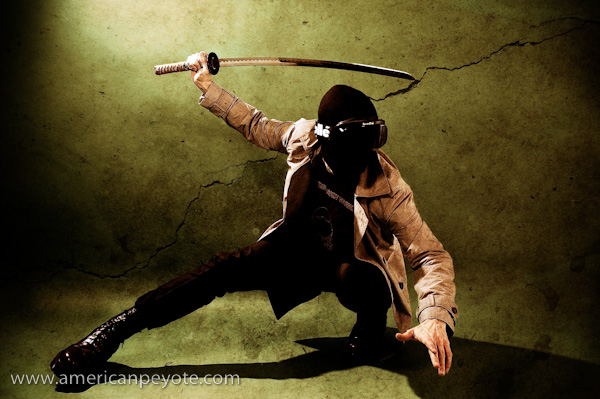 People often go through various stages of fascination and impulsive buying when getting into photography equipment (but I also admit I’m a little special in this regard). Once you figure out how to use a normal speedlight like the Nikon SB family of flashes or the Vivitar 285 or Sunpak 383 flash, you start to lust for more. You don’t know what that “more” is, but it’s something like a studio flash but portable like a speedlight. That’s when you decide that it would be cool to buy a bare-bulb flash, and the Sunpak 120J is the obvious choice.
People often go through various stages of fascination and impulsive buying when getting into photography equipment (but I also admit I’m a little special in this regard). Once you figure out how to use a normal speedlight like the Nikon SB family of flashes or the Vivitar 285 or Sunpak 383 flash, you start to lust for more. You don’t know what that “more” is, but it’s something like a studio flash but portable like a speedlight. That’s when you decide that it would be cool to buy a bare-bulb flash, and the Sunpak 120J is the obvious choice.
Bare-Bulb Design
The Sunpak 120J is a bare-bulb design, which means it doesn’t have a fresnel lens to focus the light from the flash tube when it goes pop. Aside from offering cool lighting possibilities, the bare-bulb design is wicked-retro-cool. The flash tube looks like it would fry your brain if it were set off too close and reminds one of a mad-scientist lab. But nothing useless is ever truly beautiful, and the 120J not only looks cool but produces a lot of light. It comes with a standard silver reflector, but you can remove this for use in softboxes and beauty dishes (which is what I do). The 120J was originally a manual flash, but was later produced in a TTL version with a switch-out module. With the TTL version you can buy a TTL module for Canon, Nikon, Minolta, etc. or just use a 1-pin module when triggering with slaves. I love these module designs because it gives more choice to the customer and doesn’t lock you into a flash-camera system. The original 120J is triggered via a HH-plug cord, and includes a screw thread at its base instead of a hotshoe connection. This is awesome since you can directly screw it into a flash bracket or light stand. The 120J runs on four AA batteries, but it was also sold with the TR-II battery pack. This pack is essential with a 120J in my opinion, because the flash can drain the 4 AA’s pretty quickly. Now that you know what it is, why exactly should you want one?
Why the 120J?
The 120J isn’t the only bare-bulb flash around. There’s also the Quantum flash line and the Sunpak 622 can be fitted with a bare-bulb flash tube head. However, the Quantum line is expensive and units require an external battery pack. For the money an Elinchrom Quandra setup makes more sense than a Quantum. The 622 is affordable, but with the bare-bulb head attached the setup is massive. The 120J offers bare-bulb and power in a compact package. As with many classic flashes, once it became popular with people who follow Zach Arias and Strobist, the used price sky-rocketed. I’ve seen the 120J with battery pack listed for 400 USD, that’s just crazy. If you pick up a used 120J (without battery pack) for much more than 200 USD you’re starting to tip over the price-value line for a flash of this caliber. I bought the original version for 180 USD and later the TTL version with battery pack (for like $350 or something) and I don’t regret it, but the second one was a tad overpriced.
Which Version?
I don’t recommend getting the TTL version because it doesn’t offer much more for the money. The chances that your digital camera will actually work with the TTL function is probably pretty low, so you’re left with the same manual power settings as the original version. The original manual version is triggered with a standard HH plug cord, and the TTL version accepts a 1/4 inch plug. However, it should be noted that the mounting system on the original 120J is the most bomber of any flash I own. Instead of a hotshoe connection there’s a standard screw thread, so you can securely place it on a bracket and never worry about stressing the shoe mount. This makes it ideal for off-camera setups. Both versions include 5 manual power steps, from full down to 1/16th power (like the Sunpak 383). The body design is nearly identical to the Sunpak 383, which is why I like using them together.
The 120J in Use
I primarily use my 120J flashes for location shooting, either in a small softbox or with my Kacey Beauty Reflector. For example, when I worked with Margarita, I used a 120J in a Kacey beauty dish placed close, and was able to knock back the ambient light of the area we were shooting in. This combination gives me a lot of beautiful light wherever I am in the world. When coupled with an external battery pack (Sunpak, Quantum, etc) it’ll keep flashing nearly all day and at the highest power will give you sun exposure balancing flexibility. I also use the 120J indoors in my apartment studio when I want a lot of hard light by installing the 120J silver reflector. This sends a lot of unmodified light where I want it. For example, I used a 120J in my Urban Ninja series to place a hard shadow in the image just below the Ninja shown below.
Despite it’s big-bulb design the 120J travels pretty well. When I fly I just take out the bulb and pack the 120J body in my Think Tank Airport Acceleration or Pelican 1510. Two 120J’s pack together symmetrically and it takes just a few seconds to reassemble the flash for action.
 Accessories
Accessories
At some point I want to experiment with the DIY radio camera triggers or the Radio Poppers and see if you can control the TTL flash remotely. If this happened it would almost be worth the crazy prices some people are willing to pay for one. The 120J is also one of the few flashes with a user removable flash tube. Replacements are about 30 USD and are easy to obtain from stores like B&H or Adorama. If you want a 120J check out places like Keh.com and eBay. The eBay prices will probably be more than the 120J is worth, but if you’re rigirous in searching you might snag one for a fair price. I bought both of my 120J’s at Keh, one was “bargin” grade and looked almost like new.
For more info on using the 120J checkout Zach Arias or the 120J Flickr group.

